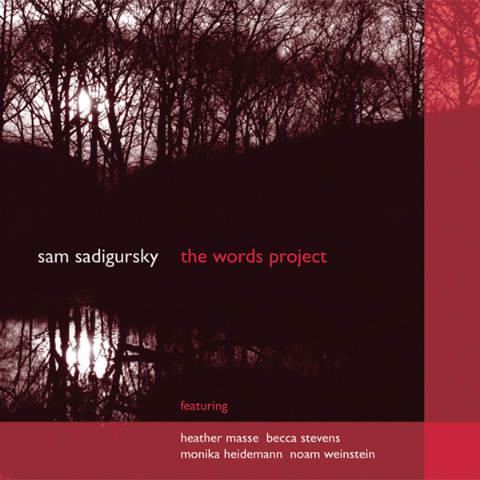Review by Brad Walseth
Words and music - a union not always equal or necessarily tranquil. Serious words, expressing perceptive thought in an artful way is hardly the norm in jazz or any music, especially since music is generally constrained by beats and measures in a way much modern poetry is not. As such, the combination of the arts of poetry and music is a rarely attempted feat and one that is hardly ever pulled off successfully, with most lyricists reverting to moon and June rhymes and shallow platitudes. Thankfully, Sam Sadigursky's The Words Project is the exception to this norm in its brilliant combination of poems by poets like Sylvia Plath, Donald Justice, Paul Auster, Maxine Kumin and Czeslaw Milosz among others with interesting music written by Sadigursky.
Milosz' love-in-the-ruins-of-modern-life poem "After Paradise" opens the recording with Heather Masse's emotive, lower-register, Joni Mitchell-ish vocalizing combining with Sadigursky's free-flowing and introspective music to match the weight and tone of the words resulting in a satisfyingly emotional and haunting experience. The core band, led by Sadigursky on reeds (here on gorgeous flutes), with Pete Rende's pivot-point piano, Eivind Opsvik on bass and Tommy Cranes's drums and array of percussion (augmented by Nate Radley on tasteful guitar), oscillate, moving dreamlike through the musical landscape.
Becca Stevens provides the beautiful vocalizing on Sadigursky's setting of Auster's "Still Life," and the music mirrors the cool sleek winter landscape of broken hearts and loss of love. With Monika Heidemann adding her voice to a slightly bluesy take on Marina Tsvetaeva's bittersweet "I'm Glad For Your Sickness," this completes a triumvirate of distaff singers who take on the majority of vocal leads, with their different styles and vocal timbres adding to the variety. Heidemann, for example sounds at time like pop singer Bjork in her phrasing, with a touch less of the outlandish inflections favored by the elfin songstress.
Masse takes Dutch poet Mark Boog's "Water, Aspirin, You" into the higher register, nearly becoming a modern classical art song with its atonality and unusual discordances - a perfect match for the poems take on a shattered relationship/persona. Stevens appears again and takes Milosz' "Love" into multi-tracked Bjorkian territory with attractively plaintive results. And Penelope Shuttle's "In the Kitchen" becomes a deconstructed tango, complete with Rende's accordion, while Osip Mandelshtam's "Gardener and Flower Too" is perhaps the album's centerpiece, expressing its moments of clarity, tempered by disillusion and dread of mortality, through shifting rhythms and sudden moves into melodicism out of the chaos. Here, as elsewhere, the core band is inventive, yet watertight, while Sadigursky thrills with his solo turn.
Plath's mysterious "You're" adds cello by Robert Burkhart to the mix, and is highlighted by Crane's effusive drumming, while "Epitaph for a Pair of Old Shoes" by American poet Donald Justice - a rather short, yet poignant poem - becomes 9:27 of art song into a jazz middle section, with Burkhart's high-registered cello and Sadigursky's clarinet effectively interjecting commentary and Rende taking a productive solo. Ending with Noam Weinstein's low vocals and Sadigursky's melancholic tenor sax on Maxine Kumin's insightful "After Love," brings the listener full circle in this remarkable exploration of the fragile frailty of life and love, brought about through the penetrating words of some of humankindís finest poets and enhanced by the memorable music of Sam Sadigursky.
|

